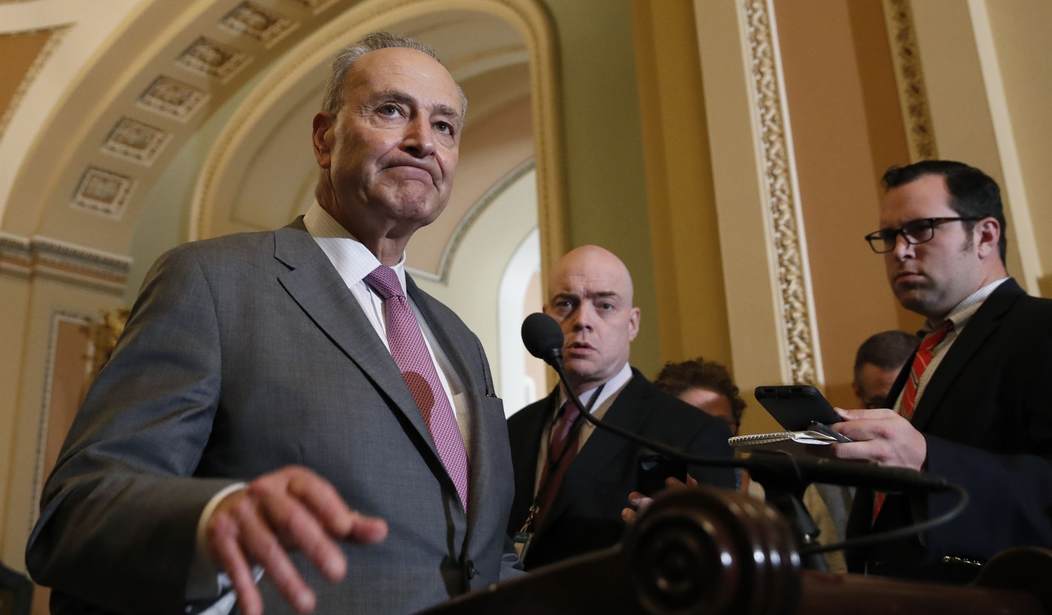To be fair, these two outcomes aren't mutually exclusive, to a certain extent. A decent sized Democratic wave could crash down on Republicans, sweeping out their House majority and a number of governors, and the GOP could still hold their upper chamber majority -- thanks to an astoundingly favorable 2018 map. That map is a double-edged sword for Mitch McConnell and company, however: If it were less slanted in their favor this cycle, they could easily lose their majority in a tough cycle. A fortunate break. On the other hand, if they were looking at the exact same map under better political conditions, they could realistically be expected to make major gains, perhaps in the ballpark of half a dozen seats. A wasted opportunity. But 2018 is what it is, and baking in all of the various and competing factors one respected prognosticator's new analysis predicts that Republicans will retain their Senate majority:
Democrats have a 1-in-3 chance of winning the Senate majority this November, according to FiveThirtyEight’s just-launched 2018 Senate forecast. Republicans have a 2-in-3 chance of keeping control. Unlike in the race for the House of Representatives, in which Democrats are favored, they’re fighting uphill in the upper chamber. The FiveThirtyEight Senate model produces probabilistic forecasts, as opposed to hard-and-fast predictions about who will win or lose, using a statistical model that looks at polls of each race, fundraising, how each state has voted historically and more.
As of now, odds still favor GOP retaining control of Senate because of the one-sided nature of seats/states on the map. BUT Senate Ds are also benefiting from desire for Congress to check Trump. If Dems beat the odds in the Senate, we'll start our analysis with 'check' motive.
— Larry Sabato (@LarrySabato) September 12, 2018
The 'check on the president' question is interesting, in that it feeds into the intensity advantage Democrats enjoy. In certain wave years, polls end up missing the degree to which turnout disparities turn unlikely scenarios into realities -- which is why Republicans should absolutely not rest assured that the Senate will stay in their hands after the fall. That said, whip-sharp political writer Josh Kraushaar surveys the landscape and concurs with the FiveThirtyEight verdict, building the case that GOP Senate gains might be the likeliest outcome, based on the data at this stage:
Recommended
The odds [of a Democratic Senate takeover] aren’t any better now than they were several months ago. Republicans have made progress in several key states (North Dakota, Missouri, Arizona) even as they’ve suffered setbacks in others (West Virginia, Indiana, Montana). All told, it’s looking most likely that the Senate will remain closely divided, with Republicans holding their narrow advantage past 2018. Republicans will blow a historic chance at picking up many seats, given the uniquely favorable Senate map, while Democrats are still struggling to ensure that all their vulnerable red-state senators return to Congress despite a favorable national environment. Here’s the Senate math: If Republicans can defeat two of the six vulnerable Democratic senators up for reelection, they’ve locked down their majority for another cycle. Strategists from both parties agree that Republicans have pulled ahead in North Dakota, where Sen. Heidi Heitkamp is facing a spirited challenge from Rep. Kevin Cramer. Public polls show Missouri's and Florida’s contests as pure toss-ups, while Indiana remains highly competitive.
Kraushaar juxtaposes two competing theories about the nature of this possible wave year, acknowledging the idea that because of the types of states that comprise the Senate battle in 2018, those dynamics simply do not match up with a blue House wave. In other words, as Charlie Cook posits: "the House and Senate races are operating in two entirely different universes." However, another camp reasons that as waves develop and cascade across the country on election night, close races tend to break heavily in favor of the party that's surfing that wave. Kraushaar explains why he sides with the former theory:
One senior Republican official compared wave elections to a different meteorological phenomenon: tornadoes, which can wipe out one neighborhood but leave a nearby one untouched. The 2010 GOP landslide hardly affected vulnerable Democrats in the West, which has since emerged as a Democratic beachhead in the Trump era. And in the Democrats’ 2006 wave, the only close Senate race that Republicans won took place in Tennessee, then in the middle of a political realignment to the right. The latest round of public polling, while showing red-state Democrats competitive, also contain warning signs for the Democratic candidates...The blue wave that’s expected to hit Northern Virginia is unlikely to impact North Dakota. The path for Democrats to win the Senate majority depends on a near-sweep of the most Trump-friendly parts of the map: Tennessee, Missouri, and West Virginia. If Democrats shock the political world with these unlikely red-state upsets, impeachment will be the least of Trump’s troubles.
A flurry of brand new statewide surveys from Fox News' well-regarded pollster underscores Kraushaar's point...and Democrats' challenge:
Slew of new Fox News Senate polls:
— Guy Benson (@guypbenson) September 13, 2018
AZ: D+3 (would be a Dem gain)
IN: R+2 (GOP gain)
MO: D+3 (Dem hold)
ND: R+4 (GOP gain)
TN: R+3 (GOP hold)
Upper chamber up for grabs.
Notice that Sinema's slim lead in this Arizona poll is better for her than the last few numbers we wrote about earlier, but that race has clearly gotten much more competitive than Democrats were hoping for. And by the way, why am I writing obsessively about Senate races? You know why. I'll leave you with the latest ad out of West Virginia, where Joe Manchin appears favored to win re-election -- a fate that could be compromised by voting against Brett Kavanaugh's confirmation:

























Join the conversation as a VIP Member